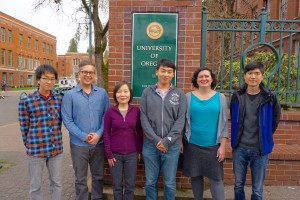Mapping Early Korea in a Globalized Context: Interdisciplinary Approach to Origins of Agriculture and Social Complexity in Prehistoric-Early Historic Korea
 This project, sponsored by the Academy of Korean Studies, examines the emergence of agriculture and subsequent intensification process in terms of cultural resilience and social complexity in early Korea from the Neolithic to early Three-Kingdoms period, within a broad East Asian perspective. The shift from hunting-gathering to settled, farming societies was negotiated in distinct ways across the globe, influenced heavily by the mutual engagements between human agents and their ever-changing environments. By exploring the ways humans have interacted with the environment, we are able to seek answers about overarching research issues, including but not limited to:
This project, sponsored by the Academy of Korean Studies, examines the emergence of agriculture and subsequent intensification process in terms of cultural resilience and social complexity in early Korea from the Neolithic to early Three-Kingdoms period, within a broad East Asian perspective. The shift from hunting-gathering to settled, farming societies was negotiated in distinct ways across the globe, influenced heavily by the mutual engagements between human agents and their ever-changing environments. By exploring the ways humans have interacted with the environment, we are able to seek answers about overarching research issues, including but not limited to:
- the initial transition from foraging to farming and major forces that prompted this transition;
- the nature of settlement choices on the Korean landscape amid agricultural intensification;
- the interplay of social systems and environmental shifts, the role of ecology and agriculture in social complexity;
- the changes and continuity in food culture over time, belief systems, and economic exchange over time;
- a complicated web of cultural interactions that mobilized crop and livestock dispersal to Korea; and
- comparative perspectives on early agricultural societies in Korea, Northeast China, and Japan.
Scholarship on Korean archaeology has developed rapidly in quality and quantity within Korea. The number of excavations is over several hundred annually resulting in numerous publications in several journals and academic publishers in Korean. Compared to such an accomplishment, discourse on Korean archaeology is minimal in global scholarship, summing less than 30 of publications in major journals and academic publishers in English (and much less in other foreign languages except for those in Japanese) in total. Academics and the public need to be led more intentionally to Korean archaeology as an exemplary case study for many of the most fascinating questions on humanity. Particularly, by exploring the ways humans have interacted with the environment, we are able to seek answers about the initial transition from foraging to farming, the nature of settlement choices on the Korean landscape, the interplay of social systems and environmental shifts, the role of ecology and agriculture in social complexity, changes and continuity in food culture, belief systems, and economic exchange over time, all of which place Korea as a pivotal focus of development in the East Asian region and worldwide.

Project team members Hyunsoo Lee, Chris Bone, Gyoung-Ah Lee, Habeom Kim, Rory Walsh, and Seunggi Kwak
Our research team unites methodologies from archaeobotany, genomics, organic residue analysis, paleoenvironmental reconstruction, landscape analysis, mortuary archaeology, and ceramic geochemistry. We take a long view of Korean history, working on the Neolithic through the Three Kingdoms period, in order to reach our goals:
- Fostering comparative perspectives on early human ecological relationships in their many facets across East Asia;
- Opening communication among disparate research groups;
- Developing common research agendas situated in a broad historical ecology framework;
- Training multi-disciplinary students to activate Korean Studies-related research

